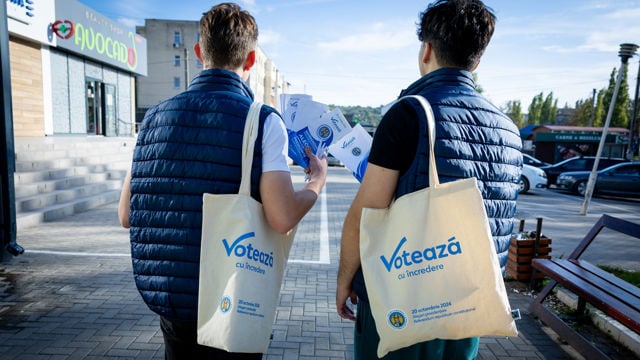Elections in Moldova - Norwegian support to ensure fair elections

Through mobile teams, around 20,000 citizens from 32 districts were informed about the presidential election and referendum as part of the information campaign “Vote with confidence!”, organized by the Central Electoral Commission with support from Norway and UNDP.
On 20 October, Moldova held presidential elections and an EU referendum. The ‘yes’ side to enshrining EU membership in the constitution won by a small margin, while the presidential election will be finally decided on 3 November. Norway is supporting electoral institutions in Moldova through the United Nations Development Programme (UNDP) to facilitate fair elections.
Moldova is a small and poor country that shares a long border with Ukraine. The country is highly vulnerable to Russian influence and disinformation. Bribery of voters and illegal financing has posed a challenge ahead of the presidential elections and the EU referendum. By supporting UNDP's election project, Norway is helping to ensure that more Moldovans have the opportunity to make informed choices when they go to the polls.
Norwegian support has made it possible for the Moldovan Central Electoral Commission to carry out its largest ever voter education campaign, called ‘Vote with confidence.’ The campaign aims to promote informed voter participation and was distributed via TV, radio, public transport, social media and print media. Two mobile teams also travelled to 32 districts and distributed information materials. In addition, UNDP, in collaboration with the electoral commission and the police, has launched a campaign to discourage vote buying, especially targeting vulnerable groups.
On election day, ‘I voted’ stickers were distributed nationally for the first time. These stickers allow voters to show pride and civic engagement, and can encourage others to vote. In addition, first-time voters received wristbands with the text ‘My first vote is 20 October 2024,’ to encourage participation.
To ensure cybersecurity, the digital systems of the Electoral Commission have been strengthened against instability caused by DDoS attacks. This type of attack is the main cyber risk for the election day. Advanced firewalls, purchased with support from Norway, will be installed after the election. Previous elections have had problems with poor training of election workers. This year, the Centre for Continuing Education in the Electoral Field (CICDE) has trained a record number of election workers with support from Norway, and the research centre CIVIS is monitoring the training to ensure the integrity and effectiveness of the training, as well as collecting data to optimise the programme ahead of the parliamentary elections in 2025.